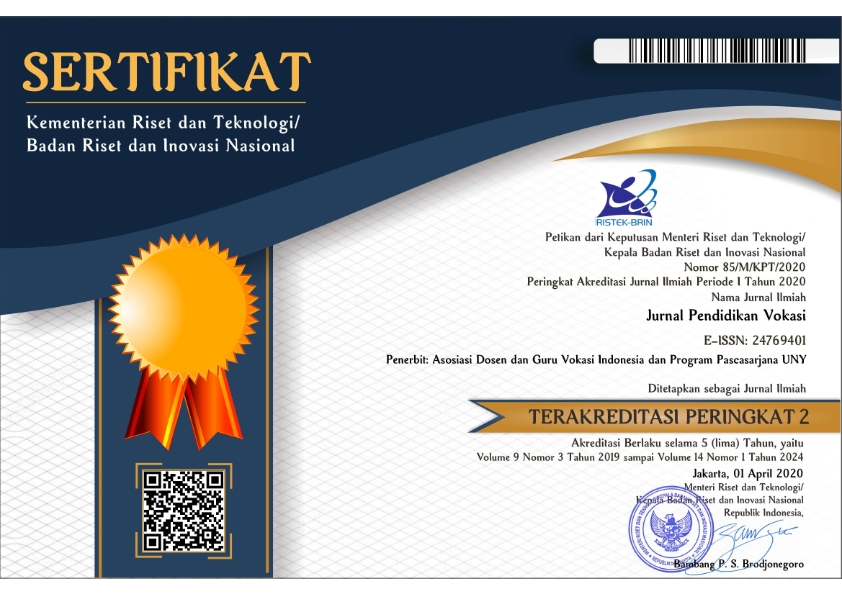Implementation of the learning process: Efforts to improve the quality of vocational education graduates
Abstract
Keywords
Full Text:
PDFReferences
Areli, A. J., Lian, B., & Kristiawan, M. (2020). An evaluation of implementation industrial work practice programs in vocational school. International Journal of Progressive Sciences and Technologies, 20(2), 179–186. https://doi.org/10.52155/ijpsat.v20.2.1802
Atmacasoy, A., Ok, A., & Şahin, G. (2018). An evaluation of introduction to industrial engineering course at Sabancı University using CIPP model. Engineering Education for Sustainable Development Conference (EESD 2018), 181–188. https://research.sabanciuniv.edu/36148/1/EESD2018Proceedings_Atmacasoyetal_IIE.pdf
Creswell, J. W. (2013). Qualitative inquiry and research design: Choosing among five approaches (3rd ed.). SAGE Publications, Inc.
Creswell, J. W., & Clark, V. L. P. (2011). Designing and conducting mixed methods research. SAGE Publication. https://www.google.co.id/books/edition/Designing_and_Conducting_Mixed_Methods_R/6tYNo0UpEqkC?hl=en&gbpv=0
Dahalan, D., D’Silva, J. L., Ismail, I. A., & Mohamed, N. A. (2020). Entrepreneurship readiness among students of Technical and Vocational Education and Training (TVET) Institutions in Malaysia. International Journal of Academic Research in Business and Social Sciences, 10(15), 164–175. https://doi.org/10.6007/IJARBSS/v10-i15/8241
Donkor, F., Nsoh, S. N., & Mitchual, S. J. (2009). Assessment of a supervised industrial attachment of a technical and vocational teacher education program in Ghana. Asia-Pacific Journal of Cooperative Education, 10(1), 1–17. http://www.apjce.org/files/APJCE_10_1_1_17.pdf
Ernawati, E., Buang, N. A., Yulastri, A., & Ganefri, G. (2019). Entrepreneurship career choice and its influencing factors among the graduates of diploma in fashion and design from University of Padang, Indonesia. International Journal of Innovative Technology and Exploring Engineering (IJITEE), 8(7S2), 344–349. https://www.ijitee.org/wp-content/uploads/papers/v8i7s2/G10600587S219.pdf
Eryanto, H., Swaramarinda, D. R., & Nurmalasari, D. (2019). Effectiveness of entrepreneurship practice program: using CIPP program evaluation. Journal of Entrepreneurship Education, 22(1), 1–10. https://www.abacademies.org/articles/effectiveness-of-entrepreneurship-practice-program-using-cipp-program-evaluation-7572.html
Haron, H., Hussain, M., Ali, A., Rus, C., & Zulkifli, M. (2019). The importance of generic skills for technical and vocational students employability. International Journal of Academic Research in Business and Social Sciences, 9(7), 33–45. https://doi.org/10.6007/IJARBSS/v9-i7/6089
Hidayah, H. N. (2020). Precondition model for field work practices based on project-based learning to improve vocational school stundents’ competence and readiness in entrepreneurship, fashion design expertise program. Journal of Vocational and Career Education, 5(2), 128–139. https://doi.org/10.15294/jvce.v5i2.29366
Imansari, F. I. (2017). The impact of entrepreneurship education to entrepreneurial intention and motivation. Proceedings of the 2nd International Conference on Economic Education and Entrepreneurship (ICEEE 2017), 257–262. https://www.scitepress.org/Papers/2017/69809/69809.pdf
Iwu, C. G., Opute, P. A., Nchu, R., Eresia-Eke, C., Tengeh, R. K., Jaiyeoba, O., & Aliyu, O. A. (2021). Entrepreneurship education, curriculum and lecturer-competency as antecedents of student entrepreneurial intention. The International Journal of Management Education, 19(1), 100295. https://doi.org/10.1016/j.ijme.2019.03.007
Lang, C., & Liu, C. (2019). The entrepreneurial motivations, cognitive factors, and barriers to become a fashion entrepreneur: A direction to curriculum development for fashion entrepreneurship education. International Journal of Fashion Design, Technology and Education, 12(2), 235–246. https://doi.org/10.1080/17543266.2019.1581844
Mawonedzo, A., Tanga, M., Luggya, S., & Nsubuga, Y. (2021). Implementing strategies of entrepreneurship education in Zimbabwe. Education + Training, 63(1), 85–100. https://doi.org/10.1108/ET-03-2020-0068
Okolie, U. C., & Ogbaekirigwe, C. (2014). Entrepreneurship development through vocational education training: Issues and roles in skills acquisition and manpower development in a developing economy. Journal of Educational Policy and Entrepreneurial Research (JEPER), 1(2), 151–157. http://jeper.org/index.php/JEPER/article/view/28
Purwana, D., Suhud, U., & Arafat, Y. M. (2015). Taking/Receiving and Giving (TRG): A comparison of two quantitative pilot studies on students’ entrepreneurial motivation in Indonesia. International Journal of Research Studies in Management, 4(1), 3–14. https://www.researchgate.net/profile/Dedi-Purwana/publication/273299848_Takingreceiving_and_giving_TRG_A_comparison_of_two_quantitative_pilot_studies_on_students’_entrepreneurial_motivation_in_Indonesia/links/565c2c5208aefe619b251f50/Taking-receiving-and-
Sandroto, C. W., Riyanti, B. P. D., & Warmiyati, M. T. (2018). Entrepreneurial intention and competencies of vocational and high school graduates in Indonesia. Pertanika Journal of Social Sciences & Humanities, 26(Special Issue), 225–236. https://web.p.ebscohost.com/abstract?site=ehost&scope=site&jrnl=01287702&AN=134081850&h=H2Og87%2BBOPosis8I6sIE%2BL39rdDr0eUFwl4Q22vottr3gdasNLoe%2FBcppOmmelzzpyCxJeRp9JVKlhQn33JbMg%3D%3D&crl=c&resultLocal=ErrCrlNoResults&resultNs=Ehost&crlhashurl=login.as
Stufflebeam, D. L. (1971). The relevance of the CIPP evaluation model for educational accountability. The Annual Meeting of the American Association of School Administrators, 1–30. https://files.eric.ed.gov/fulltext/ED062385.pdf
Umam, K. A., & Saripah, I. (2018). Using the Context, Input, Process and Product (CIPP) model in the evaluation of training programs. International Journal of Pedagogy and Teacher Education, 2, 183–194. https://doi.org/10.20961/ijpte.v2i0.26086
Yuan, C.-H., Wang, D., Mao, C., & Wu, F. (2020). An empirical comparison of graduate entrepreneurs and graduate employees based on graduate entrepreneurship education and career development. In Sustainability (Vol. 12, Issue 24). https://doi.org/10.3390/su122410563
Zhao, S., Zhang, H., & Wang, J. (2018). Cognition and system construction of civil engineering innovation and entrepreneurship system in emerging engineering education. Cognitive Systems Research, 52, 1020–1028. https://doi.org/10.1016/j.cogsys.2018.10.020
DOI: https://doi.org/10.21831/jpv.v11i3.44049
Refbacks
- There are currently no refbacks.

This work is licensed under a Creative Commons Attribution-ShareAlike 4.0 International License.
Our journal indexed by:















